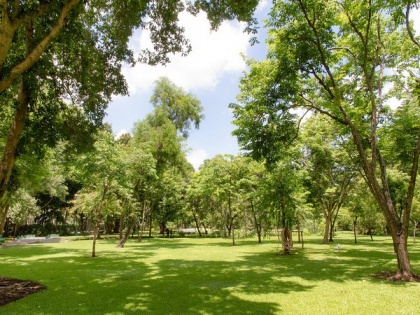Mental health benefits of parks dimmed by safety concerns, reveals study
By ANI | Published: July 7, 2020 11:07 AM2020-07-07T11:07:51+5:302020-07-07T11:20:07+5:30
Perceptions of park-centered crime may keep New Yorkers from using them, no matter how close parks are to home.

Mental health benefits of parks dimmed by safety concerns, reveals study
Perceptions of park-centered crime may keep New Yorkers from using them, no matter how close parks are to home.
Researchers at NYU Grossman School of Medicine found that New Yorkers are more likely to exercise in a park if they believe they live very close to it. In turn, they feel less anxious and less depressed the more often they exercise there -- but only if they are not concerned about being safe
"Living near a park may not be enough to improve your physical and mental well-being through exercise," says study lead author Stephe Orstad, PhD, a research assistant professor in the Department of Medicine at NYU Langone Health. "If we want to make the most of the abundant health benefits parks offer, then we need to make them not only accessible but also safe for everyone."
Many past studies have linked the availability of urban green spaces to lower stress levels, weight, and risk of heart disease, the study authors say. Other work has shown that living closer to a park leads to fewer days of anxiety and depression.
The new study is the latest to suggest that safety concerns could interfere with mental health advantages that park proximity offers New Yorkers, Orstad says.
For the investigation, the researchers analysed responses from more than 3,800 New Yorkers who completed the city's 2010-2011 Physical Activity and Transit Survey. The assessment tracked the participants' mental health, as well as how long they estimated it would take them to walk from home to the nearest park. The survey also asked participants to estimate how often they used the park to exercise or play sports.
Nearly twice as many people said they exercised in the nearest park "sometimes," or "often" if they lived less than a five-minute walk away, compared with people who estimated living more than 30 minutes away, the researchers say. In addition, people who described themselves as "frequent" park exercisers reported having one fewer day of mental health issues a month compared to people who said they "rarely" or "never" were active in their local park.
However, the closeness of a local park made no difference in park use for those who worried about crime in the area. According to Orstad, improving cleanliness and lighting along paths, offering more park-based programs, and fostering a sense of community could help make parks feel safer. She emphasized that the coronavirus pandemic has highlighted the importance of such communal programs because parks are one of the few remaining places where people can get out of their homes, be active, and connect (from a distance) with their neighbours.
"Investing in park safety offers a practical way of improving physical and mental health in different communities in the city, especially in areas where there are stigmas associated with seeking help," says senior study author Mele Jay, MD, MS, an associate professor in the Department of Medicine and Population Health at NYU Langone. "It takes advantage of resources that may already exist in the neighbourhood."
Next, the research team plans to investigate ways to improve a community's perceptions of its neighbourhood park to increase opportunities for exercise and mental health.
( With inputs from ANI )
Open in app